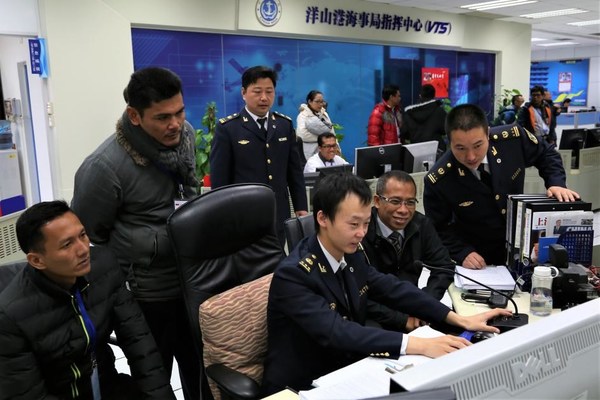China Oceanic Development Foundation: VTS Operator Training: ensuring navigation safety, promoting China-Indonesia cooperation
BEIJING,Oct. 19,2021 -- When Putu Onishi,53-year-old Chief of Shift B of Benoa Vessel Traffic Service of Indonesia,looked back at the VTS operator training program held in Shanghai 2014,he thought highly of it,"It's very good... and really useful,equipping us with the knowledge of VTS operation to support our daily duties."
The program Putu Onishi referred to was the Competence Development Program for VTS Operators of Lombok Strait and Sunda Strait. Hosted by China Maritime Safety Administration (MSA) and co-organized by Shanghai Maritime Safety Administration and Shanghai Maritime University (SMU),the training program was the first cooperative program between China and Indonesia on maritime personnel exchange and training.
Vessel traffic services (VTS) are shore-side systems which range from the provision of simple information messages to ships to extensive management of traffic within a port or waterway.[1] As crucial means for intelligent navigation,VTS have been developing rapidly in many countries,including Indonesia,where it is highly valued.
In 2013,the Eighth Meeting of the Technical Committee on China-Indonesia Maritime Cooperation proposed to deepen pragmatic cooperation between China and Indonesia in the fields of navigation safety,maritime safety,naval exchanges,marine scientific research,environmental protection,and fishery. The launching of the Competence Development Program for VTS Operators of Lombok Strait and Sunda Strait in 2014 was part of the cooperation.
In the two-week training program from November 30 to December 13,2014,Putu Onishi and his 15 colleagues from the Lombok Strait and Sunda Strait completed one-week theoretical study at SMU and then engaged in simulation practice,classroom study and group discussion at VTS center. They also visited several scenic spots in Shanghai.
"The activities were rich and varied,lasting from morning to late afternoon,then in the evenings and the next day we carried on. Time flew so fast for each activity!" Onishi said.
Among those activities,what impressed Onishi most was their visit to Wusong and Yangshan VTS Centers. "I visited these VTS centers and compared VTS of our two countries. I learned a great deal about VTS in Shanghai."

Indonesian VTS operators visited China’s Yangshan VTS Center
This is the purpose of the program. In view of the differences between China and Indonesia in VTS,the program aimed to enhance mutual trust through exchanges and mutual learning.
"It is also good for promoting law enforcement capacity of the transportation and maritime departments on both sides,coordinating the regional maritime law enforcement,and jointly maintaining safety of the sea and key shipping areas," Hu Mengfu,a trainee of this program from Shanghai Maritime Safety Administration said. "In fact,the training program enhanced friendship among staff from China and Indonesia and laid a very good foundation for deeper and higher-level cooperation between the two countries in maritime management."
Since the first VTS operator training program in 2014,China has held three more programs in 2017,2018 and 2019. Participants in the program also expanded from Indonesia to other ASEAN and South Asian countries such as Pakistan and Sri Lanka.
Last year,the Nineteenth ASEAN and China Transport Ministers Meeting promised the implementation of the maritime transport cooperation projects in 2021,including the fifth VTS Operator Training.
The fifth VTS Operator Training will be open to all ASEAN countries. According to Hu,this year's training will be conducted in August and October respectively,combining online and offline training.
Due to the lastinginfluence of pandemic,China is also exploring the use of Virtual Reality (VR) technology for remote training of VTS operator. "VR technology is suitable for operators' simulation exercises in real-world scenarios,and we have been promoting the application of VR technology to VTS operators training. Until now,we have completed the construction of practical simulation scenarios of a new VR platform. Duringthe pandemic,the VR technology will definitely be of great help for VTS operator training," Hu said.
Putu Onishi is also optimistic about the prospect of the VTS operator program. "I believe the benefit will be felt by two countries,the People's Republic of China and the Republic of Indonesia. We have learned a lot from China in maritime technology. The cooperation should continue in the long term or even forever."
"China and Indonesia cannot be apart. We work hand in hand together." Onishi added.
[1] Retrieved from International Martime Organization,https://www.imo.org/en/OurWork/Safety/Pages/VesselTrafficServices.aspx,August 18,2021.